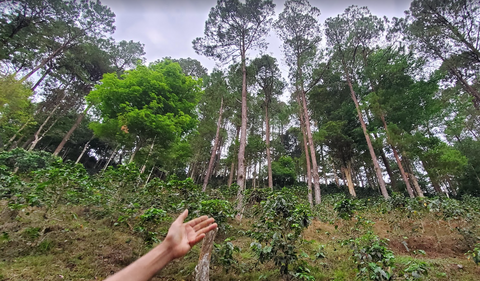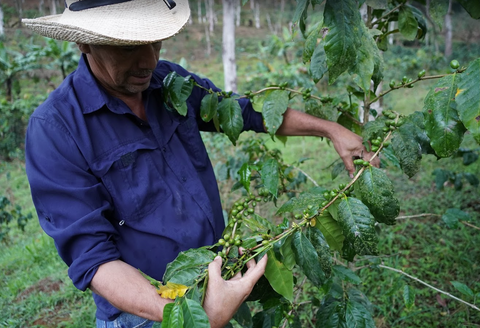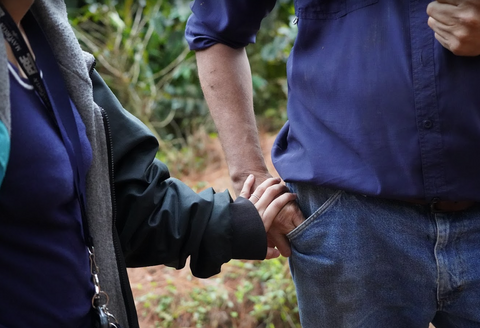Wisdom from Byron Corrales of Los Pinos farm, Nicaragua
The Corrales family has been producing coffee for four generations and adopted organic farming in 1986. They produce six containers of coffee per year from six different farms. One farm, Los Pinos, or The Pines, lies at an altitude of 1400 meters in the mountains of the El Arenal nature reserve in Matagalpa, Nicaragua.
Groundwork’s Chief Coffee Guy Jeff Chean meets with the Corrales family every year to maintain their strong relationship. This past May, Byron and his daughter, Sara, showed Jeff around their family farm. Jeff describes a symphony of birds flitting around the impressively massive trees and cows roaming freely by the grassy lakeside. The bright smell of pine needles fills the air as the much-needed rain starts to dampen the soil. When asked about his approach to organic agriculture, Byron described how he fosters ecological connection and longevity:


Cultivating a circle of life
“If we want to produce biological energy, the foundation is the connection,” Byron began. “We have a circle of life: the trees, the coffee, the cattle, the plants, the birds, the bees, everything is connected.”
In this production system, cattle are free-range throughout the expansive property. Byron mixes cascara -- the coffee fruit that is removed from the beans -- into the cattle’s hay. When cascara is combined in specific proportions with other organic materials such as peanut shells, the hay turns into a highly nutritious feed. In return, the cows produce manure that is perfect for bokashi fertilizer (a fermented compost soil amendment). Each cow can fertilize seven coffee trees daily with its manure! So, Byron ensures that the cows have enough grass and feed to eat.
“They’re connected to coffee, connected to the trees, connected to the water,” he said pointing to the cows. Even Byron himself is part of this symbiosis. He believes that the physical and mental energy that he brings to the farm contributes to a better flavor in the coffee. The wisdom that only a lifelong farmer possesses is also key to outstanding flavor – he knows how to farm with the moon cycle, discern when trees are happy or not, and smell for healthy soil.

Nurturing the living soil
Undoubtedly, healthy soil is vital in the circle of life Byron describes because it’s essentially a vast microorganism. As a living entity, soil needs to be cared for.
“The farmers that produce with agrochemicals and herbicides destroy the life of the soil,” Byron lamented. “We protect it.”
The pine trees of Los Pinos help foster rich soil. Their vast root systems help collect and hold water in the soil, and their fallen needles provide ground cover to retain moisture and help microorganisms and mycorrhizae (a symbiotic network of fungus and roots) thrive. The soil health is evident by both the rich soil aroma and coffee flavor.


Planting coffee amongst a thriving forest
In addition to the plentiful native tree population that Los Pinos respects, the Corrales family is sprouting 60,000 trees this year to build up the forest even more: pine, orange, banana, sequoia, coffee, and more. These trees provide crop diversification, bird habitat, and nutrients and shade for each other. Pine is a rare choice of shade tree, but Byron says it’s perfectly symbiotic with the coffee trees.
He cares for all the trees closely, as he feels a deep responsibility to them.
“My second marriage is with the coffee trees,” Byron said with a laugh.

Farming for the future
Byron pointed out that climate abnormalities have already impacted Los Pinos. This season, hotter temperatures and intense sun burned some coffee plant leaves that weren’t sufficiently shaded. This demonstrates how shade trees in coffeelands around the world are so important to climate change adaptation.
“I’m prepared to face this problem of climate change and I’m sure of what we need to do,” Byron said. He’ll need to further regulate the temperature of his coffee plots with more trees, strengthen the soil microbiology, and add more natural minerals to soil.
“For the other producers, it’s going to be really hard because they don’t have as many years working as me and these changes need a long time to do.” It will take nearly ten years for farmers to adapt due to the slow growth cycle of most trees.
“Above all, they need to change their conscience, and that’s the most difficult.”
One way Byron tries to equip future generations with an environmental conscience is by hosting community planting events and educational trips for students. But a worldwide paradigm shift is much more than a one-man effort. To start, it will take all of us taking a moment to think about where our cup of coffee came from. Does your daily ritual further harm or restore the earth? Groundwork pursues the latter through partnerships with farms like Los Pinos.
“I feel really happy that those who drink my coffee are drinking a cup of life,” Byron said with a smile.
-
-